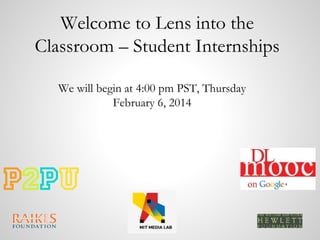
Meaningful Academic Internships
- 1. Welcome to Lens into the Classroom – Student Internships We will begin at 4:00 pm PST, Thursday February 6, 2014
- 2. Dilemma Protocol Overview ● ● ● ● ● ● ● ● Overview of the work and dilemma [5 minutes] Question prep [1 minutes] Clarifying questions (via chat; presenter responds on video) [6 minutes] Question prep [1 minutes] Probing Questions (via chat; presenter responds on video) [6 minutes] Group Conversation [10 minutes] Debrief [5 minutes] Closing the Loop [2 minutes]
- 3. Norms • • • General: Hard on the content, soft on the people. Be kind, helpful and specific. Step up, step back (monitor your airtime).
- 4. The Dilemma Randy Scherer, Humanities, High Tech High Media Arts, rscherer@hightechhigh.org How does the school best help students derive and articulate meaning through the process of an internship experience?
- 5. Meaningful academic internships • Internships strike me as unique manifestations of (and unique opportunities to address): Personalization Adult World Connections Common intellectual mission Students and teachers as codesigners Authentic work Voice and choice in action But—I think we are only at the beginning, and just discovering what is possible! • • • • • • •
- 6. How do we currently strive for meaningful internships? Internships are sought through a combination of efforts from teachers, advisors, administrators and students—although we do not use an out-of-the-classroom internship coordinator. Mentors provide or co-design projects that are meaningful to their organization and draw upon student interests or strengths. Students immerse themselves in the internship environment for approximately 3 weeks spread over a four week span. Interns present their learning to small groups of coworkers, their advisor and 10th grade students.
- 7. How is my class connected to internship? All students in my class: • Create a photo essay that tells a specific story from internship through five photos and five 200-word captions, which is shared with students’ families, co-workers and mentors. • Interview their mentors and transform this conversation into a journalistic interview published online, which is shared with students’ families, co-workers and mentors. • We create and publish Ampersand: The Student Journal of School & Work, which aims to tell the stories of internship.
- 8. Ampersand? Many years ago, my students asked for a “yearbook of internships.” This became Ampersand: The Student Journal of School & Work. For years, this was black & white, and textheavy, partially because I hoped to address some academic writing goals through it, and partially because of economics. This year, I am in the midst of a complete re-design of the book, and a partial redesign of the project.
- 9. Clarifying Questions (6 minutes) Clarifying questions are simple questions of fact. The litmus test for a clarifying question is: Does the presenter have to think before s/he answers? If so, it’s almost certainly a probing question. Some examples of clarifying questions: • How many students do you teach? • What prior experience do students have with this type of work?
- 10. Question Prep and Response Format (1 minute) 1. Brainstorm questions for the presenter 2. Participants enter their questions into the Q&A Please try to paste questions that have not already been asked.
- 11. Probing Questions (6 minutes) Probing questions are intended to help the presenter think more deeply about the issue at hand. The presenter often doesn’t have a ready answer to a genuine probing question. Examples of probing questions could be: What is your biggest worry with this issue? How do students currently reflect on their growth? Other possible probing questions begin with: How did you decide/determine/conclude...? What's another way you might...? • • • • • Probing questions should not be “advice in disguise”, such as “Have you considered…?”
- 12. Question Prep and Response Format (1 minute) 1. Brainstorm questions for the presenter 2. Participants enter their questions in the Q&A Please try to paste questions that have not already been asked.
- 13. Group Conversation (10 minutes) The conversation is not directed to the presenter. It is directed to the group and focuses on the presenter's dilemma. • Group Instructions/Questions: ■ Begin with warm feedback. What are the strengths in this situation? ■ What are the gaps? What isn't the presenter considering? ■ What recommendations does anyone have in response to the question posed by the presenter? ■ Make a list of the recommendations and post into the Q&A
- 14. Presenter Reflection (5 minutes) • The presenter has the opportunity to respond to the discussion. • It is not necessary to respond point by point to what others said. • The presenter may share what struck him or her and what next steps might be taken as a result of the ideas generated by the discussion.
- 15. Debrief (5 minutes) • The debrief is not a time to continue discussing the dilemma. • Instead focus on questions like… • • • • • • Did we have a good question? Did we stick to the question? Did our probing questions push the presenter’s thinking? Was there a moment where we got off track? How did we do with following the norms? Was there a moment where the conversation made a turn for the better?
- 16. Closing the Loop (3 minutes) Participants what they have learned from participating in this protocol and how it could inform their own practice. Post your reflections in the Q&A or post on the G+ community.
